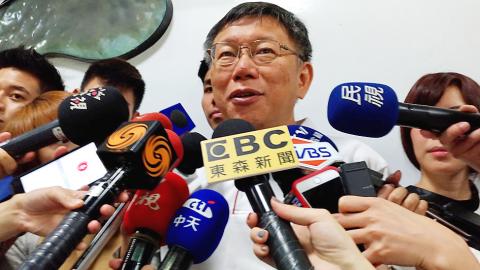People can consider the statues of historical figures on school campuses as just stone and not care about their meaning, Taipei Mayor Ko Wen-je (柯文哲) said yesterday, adding that he is planning a way to deal with the issue “properly.”
Ko made the remarks at the launch of the Taipei City Government’s annual municipal administration summer camp for students. The camp’s first session is attended by undergraduate and graduate students.
A student from National Chiao Tung University said he used to see Chiang Kai-shek’s (蔣介石) bronze statue at the Taipei Municipal Jianguo High School’s front gate when he was a student there, and asked Ko what the city government would do regarding such statues on campuses and in government institutions to ensure transitional justice.

Photo: Chang Yi-chen, Taipei Times
“That is a sharp question to ask in front of all these journalists,” Ko jokingly said. “There are many statues of historical figures in Taiwan, such as Sun Yat-sen (孫中山), Wu Chih-hui (吳稚暉), Chiang, Lin Sen (林森) and Yu You-jen (于右任), so I have been thinking about whether I should deal with the statues altogether, or only the ones of Chiang.”
Ko said he has been reading Buddhism’s Diamond Sutra and was inspired by the four manifestations of self, adding: “It is a world full of labels, meaning that you label an object you see and react to the object because of that label.”
“Honestly, why do you not just see them [the statues] as stone?” Ko said, quoting the Zen Buddhist teaching: “It is not the wind or the flag that is moving, it is your heart that is moving.”
“The meaning of the statue is given to it by the viewer, but the question is why do they care so much about it?” Ko asked.
“After being mayor for a while, I realized that most people only pursue a stable life with ensured meals every day, they do not care so much about Taiwanese independence or unification with China, nor about the pan-green or pan-blue political camps,” he said.

Nipah virus infection is to be officially listed as a category 5 notifiable infectious disease in Taiwan in March, while clinical treatment guidelines are being formulated, the Centers for Disease Control (CDC) said yesterday. With Nipah infections being reported in other countries and considering its relatively high fatality rate, the centers on Jan. 16 announced that it would be listed as a notifiable infectious disease to bolster the nation’s systematic early warning system and increase public awareness, the CDC said. Bangladesh reported four fatal cases last year in separate districts, with three linked to raw date palm sap consumption, CDC Epidemic Intelligence

Two Taiwanese prosecutors were questioned by Chinese security personnel at their hotel during a trip to China’s Henan Province this month, the Mainland Affairs Council (MAC) said yesterday. The officers had personal information on the prosecutors, including “when they were assigned to their posts, their work locations and job titles,” MAC Deputy Minister and spokesman Liang Wen-chieh (梁文傑) said. On top of asking about their agencies and positions, the officers also questioned the prosecutors about the Cross-Strait Joint Crime-Fighting and Judicial Mutual Assistance Agreement, a pact that serves as the framework for Taiwan-China cooperation on combating crime and providing judicial assistance, Liang

Reports of Taiwanese going missing, being detained or interrogated, or having their personal liberties restricted in China increased about fourfold annually last year, the Mainland Affairs Council (MAC) said yesterday. Last year, 221 Taiwanese who traveled to China were reported missing, were detained and interrogated, or otherwise had their personal freedom restricted, up from 55 the previous year, the council said. Reopening group tours to China would be risky, as it would leave travelers with no way to seek help through official channels after Beijing shut down dialogue between the associations tasked with handling cross-strait tourism, the MAC said. Taipei’s Taiwan Strait Tourism

SHIFT: Taiwan is evolving from a transit stop into a tourist destination, with more international travelers willing to spend on tours, dining and cultural activities Taiwan rose three places in the World Tourism Barometer to 36th globally in 2024, with international tourism revenue of US$10.028 billion, the Tourism Administration said on Monday. The UN Tourism Organization publication said that its focus has switched from whether a country has returned to pre-COVID-19 levels of tourism to the amount spent by a tourist during an overseas trip. The nation last year welcomed 8.57 million international tourists, about 9 percent more than in 2024, with most tourists coming from Japan, South Korea, and Hong Kong and Macau, all of which accounted for at least 1 million tourists each. During the first